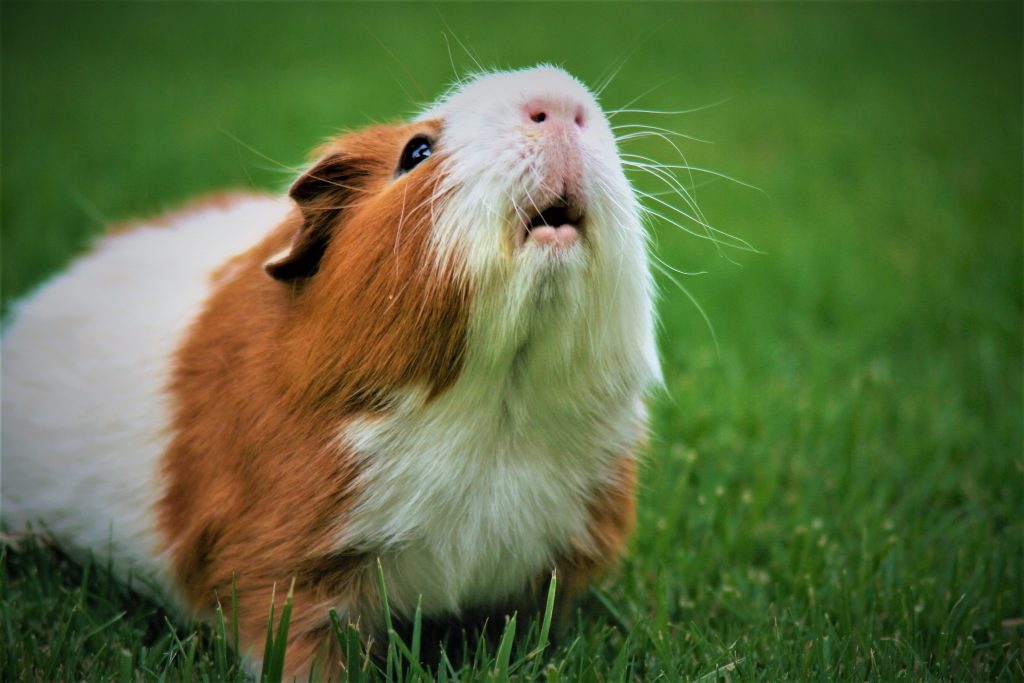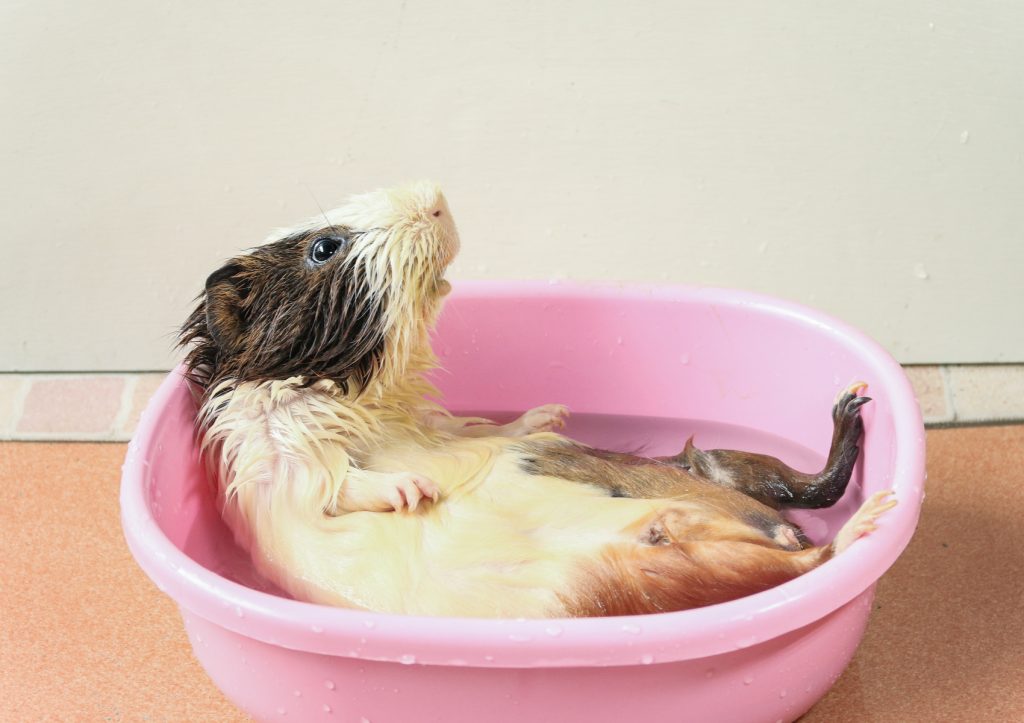While guinea pigs need water to live, it is often wondered if they like to swim or play in water. Just like other pets, each guinea pig has their own personality and preferences, but generally guinea pigs do not like to play in water or even be bathed.
Guinea Pigs are self-cleaning and typically do not need to be bathed, but in some instances, they may need to be bathed if their fur is covered in filth, grease from their caudal gland or other substances.
If you find it necessary to bathe your guinea pig you should exercise caution in doing so and monitor your guinea pig for signs of stress.
Stress/Fear
One reason that guinea pigs may not like water is that it causes them stress or fear. Guinea Pigs are sensitive to stress and changes in temperature, habitat or environment can cause such stress.
Introducing your guinea pig to water will cause a change in temperature and environment that can be stressful to any guinea pig, but especially a guinea pig being introduced to water for the first time.
Stress has a negative impact on your guinea pig’s quality of life and if the stress is intense enough can even be fatal. One theory is that intense stress negatively impacts the guinea pig’s gastrointestinal tract (GI). In some instances, stress causes the involuntary stretching and contraction of the muscles in the guinea pig’s GI which can lead to decreased appetite. In other instances, stress can diminish the guinea pig’s ability to properly digest the food that they have consumed.
Severe stress and chronic stress have also been found to be fatal to guinea pigs. Unfortunately, many owners have learned after the fact, that sudden changes in their guinea pig’s environment or startling events induced such stress that it caused the death of the animal. It is hypothesized that the death of the guinea pig in this manner is the result of a heart attack.
Signs of Stress in Guinea Pigs
The following chart lists various signs of stress to look for in your guinea pig:
| Weight Loss | Trembling |
| Poor Appetite | Hair Loss |
| Excessive Grooming | Hiding |
| Diarrhea | Head Tossing |
| Hissing | Nervousness |
| Teeth Baring | Reluctance to Move |
| Irritability | Circling of Their Enclosure |
| Aggressive Behavior | Chewing Cage Bars |
Guinea Pigs do not Enjoy Being Wet
Another reason that guinea pigs do not like to swim is that they do not enjoy being wet. One likely reason why guinea pigs do not like being wet is that it lowers their body temperature.
Animals have fur to prevent cold air from touching their skin and to act as an insulating barrier between their skin and the air. Their fur is an insulating barrier because it helps to trap the heat that they generate between the fur and their skin thus keeping them warm. When their fur gets wet, it no longer has the same ability to insulate them and keep them warm.
Being Wet can Cause Illness
Hypothermia
Being wet and cold can have more serious impacts on a guinea pig than just their discomfort. Guinea Pigs have been known to suffer from hypothermia if they are exposed to extremely cold temperatures

When a guinea pig’s fur is wet, it does not dry quickly, and this can cause the guinea pig to cool down too fast. This can be especially fatal for guinea pigs who are ill or otherwise vulnerable.
Signs of hypothermia in guinea pigs can be quick shallow breathing, hair standing on end, lethargic behavior and unwillingness to eat.
Pneumonia
Pneumonia can be another fatal result of forcing your guinea pig to swim or be in the water too long. Pneumonia in guinea pigs can have several causes, such as Bacterial Pneumonia, Viral Pneumonia or Aspiration Pneumonia.
Aspiration Pneumonia can be caused if they inhale food, drink, or other substances into their lungs. By placing your guinea pig into deep water (especially unexpectedly), your guinea pig may inhale water into their lungs as they are trying to breathe.
Symptoms of Pneumonia in guinea pigs can be difficulty breathing, wheezing or labored breathing, lethargy, coughing, sneezing, nasal or ocular discharge, fever, and exercise intolerance.
Can Guinea Pigs Swim?
Guinea Pigs are natural swimmers and have the ability to swim. But unlike their close relative the Capybara, guinea pigs are not fond of swimming and do not engage in this activity for enjoyment. Generally, in the wild, if a guinea pig is seen swimming it is in an attempt to escape from a predator or other form of danger.
Dangers of Putting Your Guinea Pig in Water
Fear/Illness
Some of the dangers of putting your guinea pig in water are the same reasons that guinea pigs do not like being placed in water as discussed above. These reasons are that it causes stress/fear and it can lead to illnesses that can be fatal.
Sensitive Skin
Another danger associated with placing your guinea pig in water is that guinea pigs have sensitive skin. One key contributor to skin problems in guinea pigs is excessive moisture.
Guinea Pig’s natural habitats are typically dry climates, such as the mountains in South America. Since guinea pigs have very dense fur that can retain a significant amount of water, guinea pigs’ fur does not dry quickly which can lead to skin irritations.
Chemicals
Skin irritations in guinea pigs can also be caused by chlorine. While guinea pig’s skin is sensitive in general, it is especially sensitive to chemicals.
Chlorine is often added to pools to prevent bacteria growth, but it is also added to tap water to remain compliant with EPA regulations. Chlorine is known to strip the skin of its natural oils thus creating the opportunity for dry irritated skin.
Fungal Infections
Fungal Infection in guinea pigs is also often caused by exposure to moisture. In the wild, these fungal infections can occur during rainy periods or periods of high humidity.
Placing your guinea pig in water can also cause fungal infections. These infections typically effect the hair and top layer of skin.
Symptoms of fungal infections in guinea pigs can be dry/scaly skin on the ears, nose, and feet. This dry scaly skin can also be accompanied by dandruff-like skin on the coat of the guinea pig and hair loss.
Drowning
Despite guinea pigs having the innate ability to swim, their bodies are not specifically designed for this activity. Given the design of their body and the additional weight of wet fur that they must keep afloat, swimming can be a very physically draining task for your guinea pig.
As the guinea pig becomes physically exhausted from this task, the risk of drowning increases. Furthermore, as guinea pigs swim, they often inadvertently inhale water as they are swimming and struggling to stay afloat which can cause drowning.
Conclusion
Even though guinea pigs have the ability to swim, it is not advisable to place your guinea pig in water to force them to do so. Placing your guinea pig in water can cause both stress and illness, either of which can be fatal to your pet.

